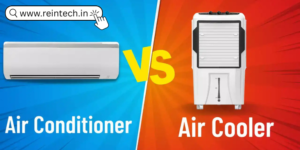In the scorching heat of summer, staying cool and comfortable at home is a top priority for many people. Air conditioners and evaporative air coolers are two common choices when it comes to cooling solutions. Both have their pros and cons, but which one is the right choice for you? Let’s compare air coolers and air conditioners to help you decide which one fits your lifestyle.

Presentation on Air Cooler vs Air Conditioner
| Section | Air Coolers | Air Conditioners |
|---|---|---|
| Introduction | Introduction to air coolers | Introduction to Air Conditioners |
| How They Work | How Air Coolers Work | How Air Conditioners Work |
| Energy Efficiency | generally more energy-efficient | can be less energy-efficient than air coolers |
| Cost Comparison | Typically cheaper upfront | generally more expensive upfront |
| Installation and Maintenance | Simple installation and maintenance | More complex installation and maintenance |
| Cooling Capacity | Limited cooling capacity | higher cooling capacity |
| Environmental Impact | generally more environmentally friendly | may have a higher environmental impact |
| Suitability for Different Climates | more effective in dry climates | effective in various climates |
| Noise Levels | generally quieter | can be noisier, especially window units |
| Mobility and Portability | Often more portable and easier to move | can be heavy and less portable |
| Health Considerations | It helps increase humidity and is beneficial for skin and plants | It filters air, reduces indoor pollutants, and is better for allergies |
| Aesthetics and Design | Various designs and sizes are available | typically larger and less aesthetically pleasing |
| Conclusion | Summary of key differences and considerations | Summary of key differences and considerations |
How Air Coolers Work
Air coolers, also known as evaporative coolers, work by drawing warm air from outside through a wet cooling pad. This pad absorbs heat from the air, causing the water to evaporate and cool the air. The cooler, now cool and moist, is then circulated into the room, lowering the temperature. Top Air Conditioner Manufacturers in Noida: The Brands You Can Trust!
How Air Conditioners Work
Air conditioners use refrigerant to cool the air. The refrigerant absorbs heat from the indoor air, which is then expelled outside, while cool air is circulated back into the room. Until the target temperature is reached, this process is repeated.
Energy Efficiency
In general, air conditioners use less energy than air conditioners. They consume less electricity because they do not use a compressor or refrigerant. This makes them a more environmentally friendly option and can result in lower electricity bills.
Cost Comparison
In terms of initial cost, air conditioners are significantly cheaper than air conditioners. However, air conditioners are more efficient at cooling large areas and can be more cost-effective in the long run, especially in areas with extremely hot summers.
Installation and Maintenance
Installing and maintaining air coolers is a simple task. They do not require any complex ductwork or professional installation. On the other hand, air conditioners require professional installation and regular maintenance to ensure optimal performance.
Cooling Capacity
Air conditioners are more effective at cooling large areas and can maintain a consistent temperature regardless of outdoor conditions. Air coolers are better suited for smaller spaces and are less effective in areas with high humidity.

Environmental Impact
Air coolers are considered more environmentally friendly than air conditioners because they do not use refrigerants that contribute to global warming. However, they do consume water, so it’s essential to consider water usage in areas with water scarcity.
Suitability for Different Climates
Air coolers are ideal for dry climates where humidity levels are low. They work best in areas with hot, arid summers. Air conditioners, on the other hand, are suitable for all climates but are especially effective in humid conditions.
Noise Levels
Air coolers are generally quieter than air conditioners because they do not have a compressor. This makes them a better choice for light sleepers or those who prefer a quieter environment.
Mobility and Portability
Air coolers are typically more portable than air conditioners. They are often mounted on wheels, making them easy to move from room to room. Air conditioners, on the other hand, are usually stationary and require professional installation.
Health Considerations
Air coolers add moisture to the air, which can be beneficial for people with respiratory issues or dry skin. If they are not cleaned on a regular basis, they can also encourage the growth of bacteria and mold. Air conditioners dehumidify the air, which can help reduce allergens and improve indoor air quality.
Aesthetics and Design
Air coolers are usually more compact and have a simpler design than air conditioners. They are available in a variety of colors and styles to suit different aesthetics. Air conditioners, on the other hand, are bulkier and may not blend in as seamlessly with the décor.
Conclusion
Air conditioners and air coolers each have benefits and drawbacks. The right choice for you depends on your climate, budget, and personal preferences. If you live in a dry climate and are looking for an energy-efficient and affordable cooling solution, an air cooler may be the best option. However, if you prioritize precise temperature control and are willing to invest in a more expensive system, an air conditioner may be more suitable.
